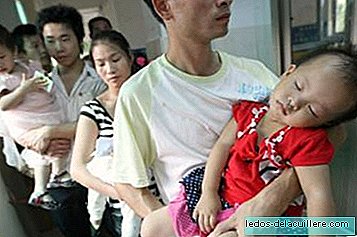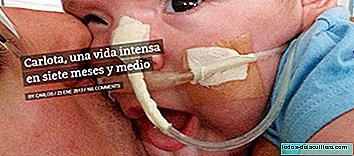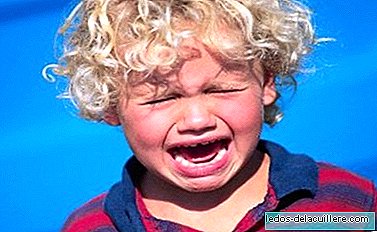
In the previous topic I have begun a review of the history of artificial breastfeeding, to support the personal opinion that I defend: for maximum safety in health, to guarantee the rights of families and children and to promote a real implication of the health system in improving aid to mothers who want to breastfeed, consider artificial milk as a medicine It is a defensible option.
In the case of rejecting this consideration, if it is necessary to increase the sanitary control of the product, its effects and improve its distribution, furthermore desirable studies on its effects, something that was not done before it began to be used extensively.
The global hypolactia epidemic
With the publicity against breastfeeding and in favor of artificial milk began a real epidemic of hypolactia worldwide, based on social reasons but also on powerful economic interests.
Even when work began to limit the deceptive advertising of artificial milk with the Breast Milk Substitute Code, the damage was already done and was very deep. Women did not know how to breastfeed and the environment was not prepared to counter the trend immediately.
Women who were not able to breastfeed were no longer a minority, but rather the bottle almost became the normal way to feed a baby. Breastfeeding declined and they began to introduce absurd customs and ideas, without any foundation, that made it almost impossible. No one was encouraged to feed on demand anymore and it seemed that no one had what is called "good milk." The women, even those who still trusted breastfeeding, were dissuaded and convinced to follow guidelines that ended their production in a short time. Babies in their 60s and 70s were barely breastfed.
The biggest experiment in health and food in history
Then something happened that I consider the greatest "experiment" in human food in Human History. Something similar had never happened, never so many children were deprived of human milk to be raised with a product from another species without real need.
Millions of children grew and grew without taking, for months, any real natural food, since artificial milk undergoes many processes to get it to be assimilated by their organisms since, otherwise, it would surely be deadly.
For children who do not drink breast milk, artificial milk is essential and no one questions the right of women to freely decide not to breastfeed. But the reality is that there is still not enough social and health culture for mothers to overcome real breastfeeding problems.
We are now approaching, although only approaching, to know the real effects of this experiment with human health, although the data is so complex and there are so many variables, that it is almost impossible to extrapolate what the true consequences on global health of this practice are. . The experiment of not feeding most babies of our species with modified milk from another animal it was never previously tested to become extensive. And it seems to me a huge irresponsibility of the health authorities of that time.
Now the data is confusing, but there is already a lot of data that indicates that artificial milk is related to greater possibilities of diseases ranging from diarrhea, otitis, intestinal infections, necrotizing enterocolitis and even childhood leukemia. It will not be the cause, but there is a relationship between its use and higher rates of these ailments.
If it had been openly formulated without maximum controls over its effects, no one would have supported it, greater guarantees would have been required, but it was not done and the extension of artificial lactation was an experiment with human health without prior scientific control any. It did not exist and protocols similar to those of a medicine are still not applied, which, although not perfect, do guarantee previous analyzes of all its consequences.
Today, although we already know the mechanisms of milk production, its composition, the techniques and the way to detect problems and solve them, some ideas are still set on fire in the collective unconscious and many personal and social reasons continue to cause many families to feed Your children with artificial milk. That is unquestionable. What needs to be done now is to change the protocols that apply to these products, to improve its quality and inform society of its added risks.
The demonstrated risks of artificial feeding
The Spanish Association of Pediatrics clearly indicates the risks of artificial milk. And there are many. They are not negligible and it is unjustifiable that it is not promoted that parents know them better. Don't "kill" the messenger, just read and then think if these side effects are not really serious. And look in the pot of artificial milk to confirm that they are not explained.
The risks to which the infant who is not breastfed or who abandons breastfeeding is submitted before the recommended are multiple. Among them an increased risk of postneonatal mortality during the first year of life, and an increased risk of sudden infant death.In addition, the non-breastfed infant has a higher risk of suffering infectious processes, especially gastrointestinal, respiratory and urinary, and these are more serious, increasing the risk of hospitalization up to times, according to studies.
More in the long term, having been fed breast milk substitutes (infant formula milks) increases the risk of atopic dermatitis, allergy and asthma in children with a family history of allergy11, decreases the effectiveness of vaccines, and increases risk of celiac disease, inflammatory bowel disease, diabetes mellitus, multiple sclerosis and cancer in adulthood. Non-breastfed girls have a higher risk of developing breast cancer in adulthood.
Several of the risks of non-breastfeeding are dose-dependent such as the risk of breast cancer, obesity, respiratory diseases and some cancers. That is, the longer the breastfeeding is maintained the more the risk decreases.
Non-breastfed infants have worse scores on cognitive tests and lower IQ and worse visual acuity, years after breastfeeding. And a shorter duration of breastfeeding has been related to the appearance of mental problems in adolescents.
Children, youth and non-breastfed adults are less stable psychologically and have a higher incidence of some mental health problems such as attention deficit hyperactivity disorder, anxiety and depression.
This and the decrease in the risk of child abuse are associated with the fact of breastfeeding and not only with the different composition of breastfeeding, since they are fundamentally related to the contact and interaction that the baby has with his mother during the act of breastfeeding Therefore, some of these beneficial effects do not occur in infants who only receive milk from their mother in a bottle.
The harm of not breastfeeding also affects the woman who does not breastfeed, who has a higher risk of postpartum hemorrhage, increased risk of spinal fracture and postmenopausal hip, ovarian cancer, uterine cancer and rheumatoid arthritis. As well as increased risk of cardiovascular disease, hypertension, anxiety and depression ”
According to the World Health Organization, giving breast milk has huge advantages over children's health.
In addition to the immediate benefits for the child, breastfeeding helps maintain good health throughout life. Adults who breastfed often have lower blood pressure, lower cholesterol and lower rates of overweight, obesity and type 2 diabetes. There are also data indicating that people who had breastfeeding get better results in the intelligence.
Babies deserve all the guarantees
A baby fed with artificial milk has the right that the food provided has the highest possible guarantees. This was not required nor was it done before the introduction of artificial milk as a staple food for millions of children, but we are in time to turn back and begin to demand greater guarantees, the same as we ordered with an aspirin or with an antibiotic. I do not believe that the exclusive feeding of millions of children deserves less consideration.
When “adapted” milk began to be used the complete preliminary control tests were never done to prove its safety or its side effects. Progress has been made by trial and error, its composition has greatly improved, and, although research and control mechanisms have increased, it still cannot be determined scientifically, with the same harsh criteria that apply to medicine, which is the best procedure of production and distribution and the best way to control health effects.
When a medicine goes on the marketIt is mandatory that it proves to be suitable for its function, its curative effects, its contraindications and its side effects are statistically determined. There are agencies that ensure that everything is complied with clearly and do not give permission for commercialization if they detect the slightest failure. This ensures the health of consumers.
But nevertheless, artificial milk is not conceived as a medicine, so the controls are different and the required tests are minor. Also, the control, although it exists, is less and there are too many cases of contamination for what any parent may consider desirable. When applying food protocols, the way of investigating before commercialization and subsequent control are different and I consider them improvable.
Although absolute security does not exist, they can be enable greater control mechanisms than those applied to the baby food industry. The same as with a medicine, which are the greatest possible controls, perhaps improvable, but clearly greater than with artificial milk.
Should artificial milk be considered as a medicine?
My question is still in the air and I hope that the notes added today make my position better understood. There has not been enough previous scientific evidence, and today we still do not know if the health problems associated with it can be attributed or what its long-term consequences are.
Perhaps it is called the medicine is not the best option, since it involves a medicalization of infant feeding, but if it would bring better controls and the demand for scientific evidence on its best composition and effects, all before it is sold to families.
However, despite the data against it and pollution problems, the lack of prospects and side effects analysis, there are other advantages to the consideration of artificial milk as a medicine. This would improve the health training of professionals, control data, the adequacy of the artificial feeding council and, in addition, would be an aid to families in the economic and guarantee of product safety. More information is greater freedom of choice and greater peace of mind. I'm sure of that.
More information | WHO
In Babies and more | Virtual museum of the history of the bottle, Code of Breast-milk Substitutes, The failure of the Code of Substitutes of Breast Milk, Artificial milk and breast milk: look for differences, Breastfeeding: everything you need to know (I), (II), Ten data on breastfeeding published by WHO today












